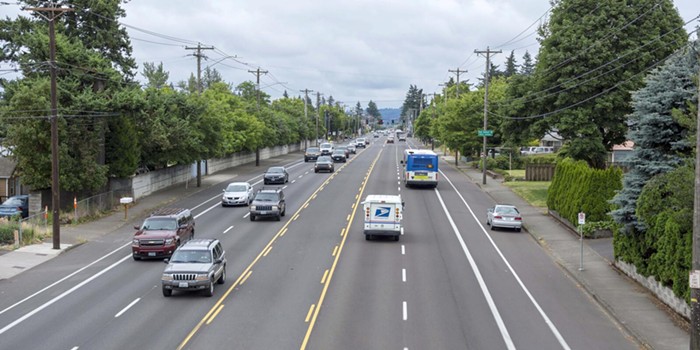This week, it's a budget death match at city hall, featuring three-hour fiscal bloodbaths—I mean, "discussions"—scheduled Tuesday through Friday where massive cuts to every single city bureau will be decided. With no one quite sure how catastrophically low the city's revenues are going to be, it's fair to say that the very fabric of our city hangs in the balance. Firing police officers, even? Well... it's not entirely out of the question.
To prepare himself for this week's challenges, City Commissioner Randy Leonard has been devoting much of his energy to bringing Major League Soccer to Portland at a potential public cost of $85 million. It's an odd priority, most certainly—but it gets even more surreal when one considers the project Leonard is most excited about: Restoring what used to be McCall's restaurant in Waterfront Park, and leasing it to the Rose Festival as office space for $1 a year.
Famed modernist architect John Yeon designed the building in 1949 as a visitors' information center. Since then it's slipped into disrepair, but Leonard's imagination has been captured. Working with an informal group of friends of the building—including Thomas Lauderdale of the band Pink Martini, and Portland Spaces Editor Randy Gragg—Leonard has matched the building's original paint color using a spectrometer, and plans to use water bureau maintenance workers to restore it in their "downtime," for a big reopening on May 22, to kick start the Rose Festival.
There'll be a new world-quality rose garden planted around the building, too, and on the roof, a 10-foot-tall red and green neon rose donated by Ramsay Signs.
"I believe this will become as iconic to Portland as the White Stag ["Made in Oregon"] sign," says Leonard, although it's not yet quite clear how the addition of the roses fits in with renovating the building to its original 1949 condition.
"An elegant rose that is not a major detraction from the beauty of the building is possible," says Gragg. "Are we there yet? No." But he's happy to leverage Leonard's "great get-it-done spirit toward some goals that would hopefully preserve the historic integrity of the building."
I asked Gragg whether there might be better uses for city money in the current budget pinch than involving the water bureau in architectural restoration projects.
"Given the need for optimism right now," he said, "optimism comes in many forms. And I totally understand what they're doing."
Would somebody pass the Kool-Aid? I seem to have missed my sip.


















